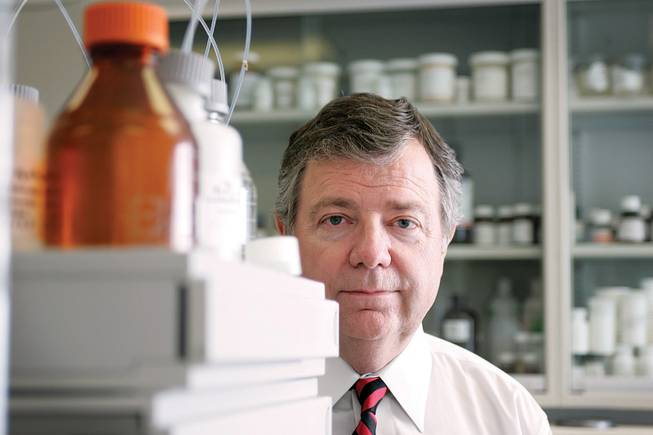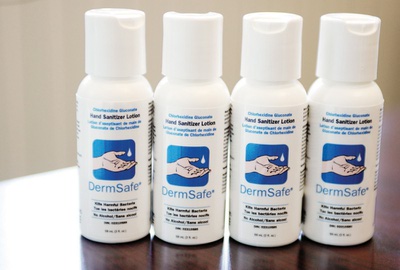
Terry Howlett, president and CEO of Skinvisible, is trying to get the Las Vegas company’s skin sanitizer, DermSafe, approved on an emergency basis for use in preventing swine flu. The FDA commissioner will ultimately decide the matter.
Monday, May 4, 2009 | 2 a.m.
Sun Archives
Beyond the Sun
Sun Coverage
Other coverage
- National AP coverage: U.S. flu tally jumps to 241 as labs catch up
A Las Vegas company that makes a hand sanitizer capable of warding off the swine flu virus for four hours has been fielding calls madly from Canada, Great Britain, Mexico and from across the United States.
And orders will soon go out around the globe — but not in this country.
Skinvisible’s product isn’t approved for sale in the United States.
The active ingredient in the sanitizer that kills germs and viruses — chlorhexidine gluconate, or CHG — is approved by the U.S. Food and Drug Administration. For 50 years, doctors and nurses have scrubbed their hands before surgery with soap containing the antiseptic.
Skinvisible’s sanitizer, called DermSafe, features a special polymer that binds CHG to the skin for four hours, offering continued protection as opposed to washing with soap or using an alcohol-based hand sanitizer.
But because no one in the United States has put CHG in a hand-sanitizing lotion, it’s not on the FDA’s list of approved ingredients that are automatically authorized for hand-sanitizing products. It is approved only under the hand soap category.
Canada, Great Britain and other countries don’t make that distinction.
For Skinvisible to get FDA approval for DermSafe, the sanitizer has to be scientifically vetted as if it’s a new product. That can take years depending on the number of studies and trials the FDA requires — not exactly helpful for the current swine flu scare.
So Terry Howlett, president of Skinvisible, is trying to get an emergency use authorization.
The flu drugs Tamiflu and Relenza have emergency-use status, so they can be distributed without meeting all the normal criteria for prescriptions. For example, public health officials instead of just doctors, nurses and pharmacists may give out the meds, and those under the minimum age to receive the drugs may get them.
In the case of DermSafe, the emergency use authorization would allow for the unapproved use of an approved product.
And progress in that direction occurred Friday when Howlett, using contact information provided by an adviser in Belgium, reached an official at the Centers for Disease Control and Prevention. The official asked Howlett to provide Skinvisible’s clinical data. The previous day, Howlett was unable to get past a hold button at the CDC.
Although the CDC would be consulted about an emergency use authorization, the FDA commissioner makes the final decision.
Skinvisible is one of many companies trying to market products in response to the flu outbreak. Established players in the soap industry, such as Dial, are planning to dramatically increase advertising, and others have updated their Web sites to include information about preventive actions — best assisted by the companies’ products, of course.
Most hand sanitizers are alcohol based and kill most germs on contact before evaporating. Those products are intended as a substitute for hand washing when water isn’t available.
Howlett said DermSafe is different because rather than evaporating, the sanitizer stays on the skin and continues to kill germs and viruses for four hours, even after frequent washing. Skinvisible developed it for the health care industry.
When the news about the swine flu broke, he said, he realized Skinvisible had tested DermSafe against the swine flu virus — known as H1N1 — and found the sanitizing lotion was 99.9 percent effective.
Skinvisible sent out a news release and “the phones haven’t stopped ringing,” Howlett said.
The Nova Scotia government has placed an order, companies in Singapore and China have called, and the company is investigating whether Mexico has regulations for CHG in hand sanitizers.
But to all the Americans who have inquired, Howlett said, the only response Skinvisible can offer is: “Phone your congressman.”


Join the Discussion:
Check this out for a full explanation of our conversion to the LiveFyre commenting system and instructions on how to sign up for an account.
Full comments policy